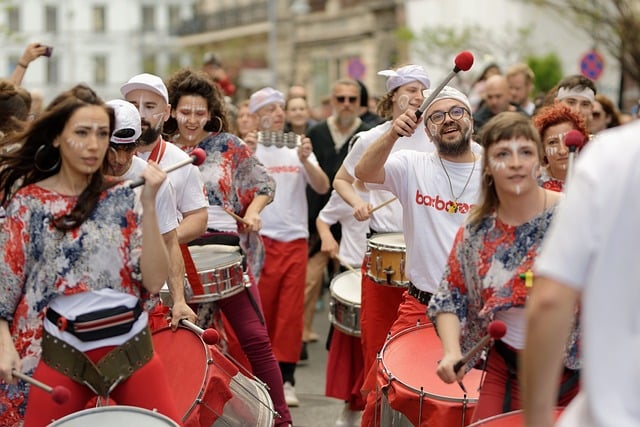Event planning is a strategic approach for local businesses to effectively engage with their community and advance their marketing objectives. A successful event should align with both the business's goals and the community's needs, whether aiming to boost brand recognition or foster customer loyalty. Effective planning involves carefully selecting venues, collaborating with other local entities, and engaging on social media to generate excitement. It also requires careful attention to logistics, including permits, equipment rentals, staffing, and safety measures. By thoughtfully integrating these elements, businesses can create impactful events that enhance their community reputation and contribute positively to the local social environment, leading to stronger community ties, heightened customer loyalty, and brand advocacy. This approach not only promotes the business but also provides a platform for valuable customer feedback and reinforces the business's commitment to community enrichment, solidifying its role within the local social fabric for sustained engagement and growth. This process emphasizes the importance of event planning in local businesses' community outreach efforts, highlighting "Event Planning for Local Businesses" as a key strategy for fostering meaningful relationships and supporting local ventures.
2023 heralds a wave of community engagement as local businesses ramp up their outreach efforts through a series of meticulously planned events. This article delves into the strategic framework that underpins effective event planning within the business community, emphasizing the alignment of business goals with community objectives. It explores the importance of leveraging partnerships to amplify outreach impact and the role of data-driven insights in crafting successful events. Additionally, the article offers guidance on creating a diverse array of activities that cater to all segments of the community, ensuring inclusivity and cultural sensitivity. Strategies for marketing and promotion are also examined, with a focus on multi-channel tactics designed to maximize reach and foster long-term relationships. Join us as we navigate the intricacies of event planning for local businesses and how they can make a lasting impact on their communities.
- Strategic Framework for Effective Event Planning in Local Business Community Outreach
- – Assessing Community Needs and Interests
Strategic Framework for Effective Event Planning in Local Business Community Outreach

To maximize the impact of community outreach events for local businesses, it’s crucial to adopt a strategic framework that guides event planning with precision and foresight. This framework begins with identifying the specific goals and objectives that align with both the business’s marketing strategy and the needs of the community. By clearly defining these goals, such as enhancing brand awareness or fostering customer loyalty, businesses can tailor their events to achieve measurable outcomes.
A successful strategic framework for event planning involves meticulous planning and execution. It includes selecting appropriate venues that resonate with the target audience, coordinating with local partners for cross-promotion, and leveraging social media platforms to generate buzz before the event. Additionally, businesses should consider the logistical aspects such as permits, equipment rentals, staffing, and safety measures to ensure a smooth experience for all attendees. By integrating these elements into a cohesive plan, local businesses can create meaningful community outreach events that not only enhance their public image but also contribute positively to the social fabric of their neighborhoods. Engaging with customers in this way helps to build strong community relationships and can lead to increased patronage and brand advocacy.

Community outreach events are a cornerstone for local businesses looking to engage with their clientele and enhance their community presence. Event Planning for Local Businesses involves a strategic approach that aligns business goals with the needs and interests of the community. These events not only serve as platforms for direct customer interaction but also as opportunities to showcase products, services, and the values that drive the local economy. By carefully selecting themes and activities that resonate with both the business and the community, these events can foster meaningful connections and support local initiatives.
Local businesses benefit from these outreach events by increasing brand awareness, gathering feedback, and fostering customer loyalty. The planning process requires a thoughtful integration of marketing efforts, logistics coordination, and a clear understanding of the target audience’s preferences. Successful event planning ensures that the event is not only well-attended but also leaves a lasting positive impression on participants, thereby reinforcing the business’s commitment to community enrichment and development. Through these events, local businesses can demonstrate their role as integral parts of the community fabric, creating opportunities for growth and sustainable engagement with their customer base.
– Assessing Community Needs and Interests

In the realm of community engagement, event planning for local businesses plays a pivotal role in assessing and addressing the needs and interests of the populace. Local business entities are often at the forefront of understanding their community’s fabric, identifying gaps, and pinpointing opportunities for meaningful interaction. To this end, they collaborate with community leaders and organizations to design outreach events that resonate with residents. These businesses leverage their resources and expertise to host initiatives that cater to a wide array of interests, from educational workshops to cultural festivities. By engaging in thorough research and gathering feedback through surveys and public forums, these entities ensure that the events they plan are not only well-attended but also contribute positively to community development. This proactive approach to event planning helps in creating a harmonious environment where every voice is heard, and every concern is addressed, ultimately fostering a strong, cohesive community.
Furthermore, the success of these events hinges on the ability to tailor activities to the diverse demographics within a community. Local businesses often partner with other local entities to pool their insights and amplify their impact. This collaborative spirit ensures that events are inclusive and reflective of the community’s multifaceted identity. The focus remains on creating opportunities for dialogue, networking, and skill-sharing that not only promote local commerce but also strengthen social bonds. Through these efforts, local businesses demonstrate their commitment to the well-being of their communities, making event planning for local businesses a cornerstone of effective community outreach.
In wrapping up, the strategic framework outlined for effective event planning within local business communities underscores the importance of aligning outreach initiatives with genuine community needs and interests. By taking this tailored approach, businesses can foster meaningful connections and enhance their engagement with the community at large. The upcoming community outreach events are set to be a testament to the collaborative spirit and commitment of local businesses to enrich the fabric of their neighborhoods. These efforts not only support the thriving of local economies but also contribute to the creation of lasting bonds between businesses and residents, ultimately strengthening the social tapestry that defines a community. Local businesses are encouraged to leverage this framework for impactful event planning, ensuring that their outreach is both relevant and beneficial to the people they serve.
